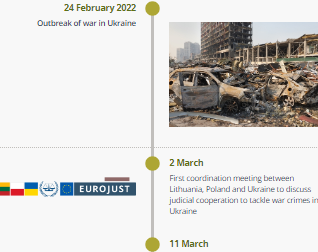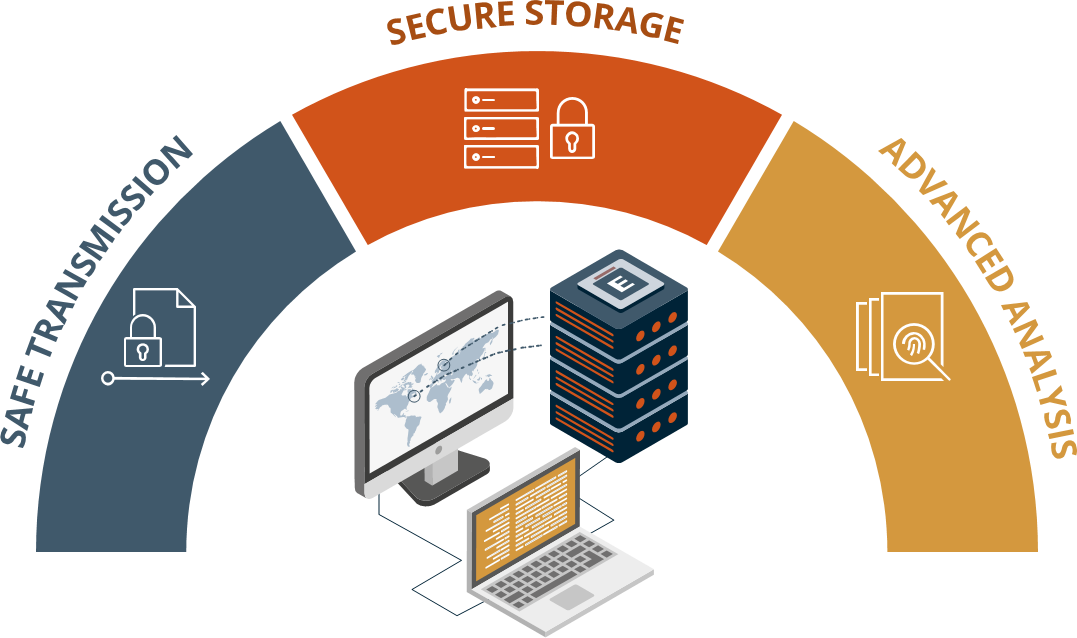Russia’s invasion of Ukraine, which began on 24 February 2022, is the most documented armed conflict in the history of humankind. It has triggered an unprecedented response from the international judicial community, with Ukraine-related investigations ongoing in over 20 countries at the time of writing, including 16 EU Member States.

A timeline of Eurojust's response to the war in Ukraine
One year onEurojust, together with the other eight EU Justice and Home Affairs agencies, issued a joint statement outlining the agencies’ support to help those affected by the war in Ukraine. Only six days after the start of the war, Eurojust organised a coordination meeting at the request of the Lithuanian, Polish and Ukrainian national authorities to discuss the prosecution of alleged core international crimes committed in Ukraine. This was swiftly followed by the set-up of a joint investigation team involving the three national authorities, supported by Eurojust and the JITs Network Secretariat.
In response to the outbreak of the war, Eurojust’s role in fighting core international crimes has been significantly enhanced, with the Agency playing an active role on various fronts. In addition to its essential support to the joint investigation team into alleged core international crimes committed in Ukraine, Eurojust has created an innovative tool to collect and analyse core international crimes evidence, and will also host a new structure to support investigations into the crime of aggression.
The Agency’s vital support to the JIT and the European Commission’s Freeze and Seize Task Force (ensuring the implementation of EU sanctions), were officially recognised in the State of the Union 2022 Achievements Report in September 2022. Moreover, two months later, the Berlin Declaration following the Meeting of the G7 Justice Ministers, underlined the key roles of Eurojust, the Genocide Network, and the European Judicial Network in ensuring the early coordination of national and international investigations into crimes committed during Russia's aggression.
Eurojust support to justice for Ukraine
Support to investigations
- Joint Investigation Team (JIT) into alleged core international crimes committed in Ukraine
- Preparation for the set up of the International Centre for the Prosecution of the crime of Aggression (ICPA)
- Coordination of national investigations into core international crimes committed in Ukraine
Collection, preservation and analysis of evidence
Practical guidance
- Guidelines for civil society organisations, jointly developed with the Genocide Network and the Office of the Prosecutor of the International Criminal Court (ICC)
- Guidelines to support first contact with refugees
- Guidelines on JITs with third countries
- Dialogue Group on Accountability for Ukraine: national investigations work stream
Training for judicial practitioners
- Practical training sessions and workshops on the investigation and prosecution of core international crimes by the Genocide Network and partners
Support to EU Freeze & Seize Task Force
- Operational support through coordinating Member States’ enforcement of European Union sanctions against listed Russian and Belarussian oligarchs through criminal law
The rapid set-up of the JIT on alleged core international crimes committed in Ukraine
Just three weeks after the war began, Eurojust supported the establishment of a (JIT) into alleged core international crimes committed in Ukraine. The speed at which the JIT was set up, followed by the prompt participation of four additional countries, the ICC, and a Memorandum of Understanding with the United States, has sent a clear message that no effort will be spared in gathering evidence and bringing those responsible to justice. The JIT is enabling close cooperation between all parties involved, and an effective and swift exchange of information and evidence.
The aim of the JIT is to facilitate investigations and prosecutions in the States concerned, as well as those which could be taken forward to the ICC. The Agency has been providing critical support to all JIT parties, including to investigators on the ground in Ukraine.
Eurojust ensures that the work of the JIT remains aligned with the various national Ukraine-related investigations currently ongoing in over 20 countries, including 16 EU Member States. During 2022, 18 cases were opened at Eurojust by national authorities in 8 Member States and 2 third countries in support of ongoing investigations in relation to war crimes and crimes against humanity, following Russia’s invasion of Ukraine. Ukraine, via the Ukrainian Liaison Prosecutor at Eurojust, is involved in all of these cases.
Support to the JIT on alleged core international crimes committed in Ukraine
Guidelines on Joint Investigation Teams Involving Third Countries
Read the GuidelinesThe Network of National Experts on Joint Investigation Teams (the JITs Network) is a network of national judicial and law enforcement practitioners who promote the use of JITs by competent national authorities. The JITs Network is supported by the JITs Network Secretariat, which is hosted by Eurojust. The JIT investigating alleged core international crimes committed in Ukraine relies on Eurojust’s and the JITs Network Secretariat’s legal, analytical, financial, logistical, administrative and operational support.
The JITs Network Secretariat has played an active role in supporting the JIT, including in the preparation of the JIT agreement and appendix on cooperation with the ICC, and by assisting the JIT parties with a range of legal issues. The JITs Network Secretariat also provides the JIT with financial support and equipment for JIT parties to communicate securely.
Checklist for Practitioners on Joint Investigation Teams Involving Third Countries
Read the ChecklistAt the time of writing, the JIT has been awarded several grants amounting to nearly EUR 200 000. This funding has covered JIT costs related to travel, accommodation, translation, interpretation and specialist expertise. The JIT was also awarded equipment (60 phones, 57 laptops, 20 printers and 20 scanners) for secure communications. The JITs Network Secretariat urgently delivered these services and assisted the JIT members with access to a special application for encrypted communication. To respond to the JIT’s specific needs, the JITs Network Secretariat has ensured agile support through its standard, urgent and exceptional funding procedures, under its 2022 JITs Funding Programme.
Moreover, the Network’s Guidelines on Joint Investigations Involving Third Countries and accompanying checklist for practitioners have also provided essential support to JIT members.
JIT into alleged core international crimes committed in Ukraine

2 March 2022 - Just six days after the outbreak of full-scale war, Eurojust organises a coordination meeting at the request of the Lithuanian, Polish and Ukrainian national authorities to discuss the prosecution of alleged core international crimes committed in Ukraine.
25 March 2022 - A JIT agreement is signed between the three national authorities, supported by Eurojust and the JITs Network Secretariat.
Up until March 2023, Eurojust hosts 16 coordination meetings of the JIT and other national authorities that are investigating alleged core international crimes committed in Ukraine. Prosecutors and investigators from 26 EU Member States and 10 third countries participate to map out the best strategy for the investigation.
25 April 2022 - In its first-ever participation in a JIT, the Office of the Prosecutor at the International Criminal Court joins as a participant. The JITs Network Secretariat is pivotal in facilitating the cooperation of the ICC which enables rapid and real-time coordination with the JIT partner countries, in connection with investigations conducted by the ICC and competent national authorities.
30 May 2022 - Estonia, Latvia and Slovakia join the JIT.
13 October 2022 - Romania joins as the JIT’s latest member.
2 February 2023 - European Commission President Ursula von der Leyen announces the establishment of an International Centre for the Prosecution of the Crime of Aggression against Ukraine (ICPA), to be based at Eurojust.
3 March 2023 - The JIT’s seven national authorities sign a Memorandum of Understanding with the United States Department of Justice to enhance coordination between their respective investigations into the war in Ukraine.
4 March 2023 - During the United for Justice Conference in Lviv, the JIT’s seven partner countries agree to amend the JIT agreement to reflect the future role of the ICPA.

Supporting JITs in times of conflict
In October 2022, the JITs Network Secretariat hosted its 18th annual meeting to discuss the use of JITs to support investigations into core international crimes and the benefits of ICC involvement in such JITs. The discussion took place in the context of the ICC having joined the JIT investigating alleged core international crimes committed in Ukraine as a participant in April.
Two proposals resulted from the meeting: the publication of joint JITs Network-ICC Guidelines for practitioners on the Involvement of the ICC in JITs, and the decision that the ICC should be more closely associated with the work of the JITs Network. This may lead to the ICC becoming an associate partner to the JITs Network in the future.
It is hoped that these actions will result in an increased and more frequent involvement of the ICC in the core operational work of JITs.
Eurojust’s role in the EU Freeze and Seize Task Force
Since March 2022, Eurojust has actively participated in the EU Freeze and Seize Task Force set up by the European Commission to ensure the efficient implementation of EU sanctions against listed Russian and Belarussian oligarchs across the European Union. Eurojust provides operational support to the Task Force by coordinating Member States’ enforcement of Union sanctions through criminal law.
This is done by:
- regularly cross-checking the list of individuals and companies sanctioned by the European Union against Eurojust’s data on existing cases handled by the Agency (this allowed Eurojust to identify and confirm seven links during 2022 that may provide extra leads on existing cases or generate new ones);
- collecting relevant information at national level on past and ongoing investigations related to those listed in the sanctions list to facilitate criminal proceedings, ultimately leading to the confiscation of assets;
- mapping legal and practical obstacles that may hinder the confiscation of assets owned or controlled by the listed individuals and companies; and
- participating in Operation Oscar set-up by the European Union Law Enforcement Agency (Europol) to support the freezing of criminal assets owned by EU-sanctioned individuals and entities.
The creation of the Core International Crimes Evidence Database (CICED)

Core International Crimes Evidence Database (CICED)
View CICED factsheetWith such a vast, fragmented landscape and so many stakeholders involved in investigations into the war in Ukraine, the need for a central, secure repository of evidence became clear early on. As an urgent response, in April 2022, the Commission presented a proposal to make the storage of evidence at Eurojust legally possible. The amendment to Eurojust’s Regulation was adopted in record time, allowing the Agency to establish its new Core International Crimes Evidence Database (CICED).
Preparations began in mid-2022 to set up a unique, tailor-made judicial database to preserve, store and analyse evidence of core international crimes (genocide, crimes against humanity and war crimes). CICED is now helping investigations into the war in Ukraine to deal with the complex landscape of thousands of events, countless pieces of evidence and multiple jurisdictions. Evidence of core international crimes is located in many different countries and comes in various languages. Refugees who can provide victim or witness statements are dispersed around the world. There are also different stakeholders involved in gathering and storing evidence: national police and judicial authorities, the ICC and non-governmental organisations.
Ukraine's fight is our fight. We must work together to make sure that war criminals are brought to justice. We need to reinforce Eurojust to make sure it has the necessary tools to deal with the scale of atrocities in Ukraine. Europe is determined and we will do what we can to help.
CICED allows us to move from a scattered to a structured approach, providing prosecutors with a detailed analysis of the available evidence that will directly assist them in building their case. The evidence in possession of just one country may not be conclusive. However, through a centralised approach, we can help prosecutors get the full picture and build a stronger case. Thanks to CICED, Eurojust will be able to make crucial links between the evidence and ensure that the efforts of different authorities are not duplicated. Moreover, CICED’s centralised approach will support national and international investigations by shedding light, not only on individual offences but also on the systemic actions behind them.
The new database consists of three components: safe transmission, secure storage and advanced analysis of submitted evidence. The technical solutions for transmission and storage are firmly in place, and since February 2023 Eurojust has started to receive evidence from national authorities. The analysis component is still under development, and is expected to be operational by the summer of 2023.
The database meets the highest ICT security standards and complies with Eurojust’s robust data protection framework, overseen by the European Data Protection Supervisor. CICED’s use is not limited to the conflict in Ukraine, and will be able to serve as a repository for evidence for any armed conflict investigated by Eurojust’s partners.
How CICED works
- Photographs
- Video recordings
- Audio recordings
- Satellite and drone images
- Witness statements
- Victim testimonies
- Medical, forensic and military reports
- Battlefield evidence
- ... and other types of evidence
- Maintain a complete overview of all evidence collected
- Strengthen the coordination of national and international investigations
- Perform targeted searches for evidence related to a specific event or location
- Identify evidentiary gaps
- Identify parallel investigations
- Advise on prosecution strategies
- Facilitate evidence and information exchange on core international crimes
- Prepare thematic reports on specific aspects of core international crime investigations (e.g. gender-based violence)
- Centrally storing evidence from national judicial proceedings in one database allows for advanced analysis
- Based on this analysis, it will be easier to determine a prosecution strategy with the greatest chance of success
- The early identification of parallel investigations leads to the more efficient use of resources and reduces the risk of legal errors
- Maintaining an overview of interviewed victims helps to avoid re-victimisation through repeated interviews
- Targeted searches for evidence result in faster and more effective national investigations
- The ability to securely store evidence away from the location of an armed conflict can prevent the loss of evidence
The International Centre for the Prosecution of the Crime of Aggression (ICPA) hosted by Eurojust
At the request of the European Commission in December 2022, Eurojust agreed to support a dedicated centre to safeguard relevant evidence and avoid unnecessary delays in the possible future prosecution of the crime of aggression. At the 24th EU-Ukraine Summit with Ukrainian President Volodymyr Zelenskyy in Kyiv on 2 February 2023, European Commission President Ursula von der Leyen announced the establishment of an International Centre for the Prosecution of the Crime of Aggression against Ukraine (ICPA) to be based at Eurojust. This will allow for optimal alignment between the existing investigations into core international crimes and the investigation into the crime of aggression in the context of the war in Ukraine.
The main purpose of the ICPA is to support and enhance investigations into the crime of aggression by securing key evidence and facilitating case-building at the earliest possible stage. The set-up for the deployment of the ICPA is expected to be in place by the summer of 2023.
Russia must be held accountable in court for its odious crimes. Prosecutors from Ukraine and the European Union are already working together. We are collecting evidence. And as a first step, I’m pleased to announce that an International Centre for the Prosecution of the Crime of Aggression in Ukraine will be set up in The Hague. This centre will coordinate the collection of evidence. It will be embedded in the joint investigation team, which is supported by our agency Eurojust. So, we will be ready to launch work very rapidly with Eurojust, with Ukraine, with the partners of our joint investigation team, as well as with the Netherlands. The perpetrator must be held accountable.
Launch of the Ukraine Accountability Dialogue Group
At the Ukraine Accountability Conference in July 2022, 45 countries pledged to set up a dialogue group to promote coordination and coherence across the diverse range of accountability initiatives aimed at achieving justice for Ukraine. Delivering on this promise, the Dialogue Group on Accountability for Ukraine was launched by the Dutch Minister of Foreign Affairs at the United for Justice Conference in Lviv in March 2023. The dialogue group is a coordination mechanism that offers countries, international organisations and stakeholders from civil society a platform to discuss and align national and international accountability initiatives.
The Group consists of four work streams headed by appointed co-chairpersons, including representatives from the European Union, the ICC, civil society and, in every case, a representative from Ukraine. Eurojust, together with the Ukrainian Prosecutor General’s Office, is co-chair of the workstream on national investigations. This work stream aims to identify key challenges faced in core international crime cases and joint proposals for policy solutions. The work stream will be built upon the existing coordination mechanisms at Eurojust (the JIT, coordination meetings between all countries investigating crimes committed in Ukraine, CICED and the ICPA). Discussing the issues arising from these operational activities with policy experts from countries with Ukraine-related investigations will allow the next steps to be defined.
While the damage caused by the Russian invasion can never be undone, we can make sure that those responsible are brought to justice. Setting up the joint investigation team has been a real game-changer in the accountability efforts and Ukraine welcomes the support received from Eurojust so far. At the same time, it is our firm belief that impunity for the crime of aggression should never be accepted. Ukraine therefore strongly welcomes the decision to set up the ICPA at Eurojust, and hopes that this will accelerate the ongoing discussions about the eventual prosecution for this supreme international crime.
